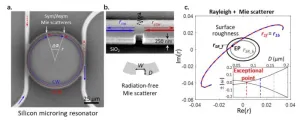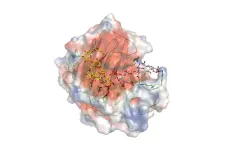(Press-News.org) SALT LAKE CITY, Sept. 6, 2023 – Myriad Genetics, Inc. (NASDAQ:MYGN), a leader in genetic testing and precision medicine, today revealed new nationwide survey results indicating widespread confusion and misconceptions about ovarian cancer screening among a majority of women.
The Myriad Genetics Cancer Risk survey shows that nearly three out of four women (71%) falsely believe annual pap smears include testing for ovarian cancer. According to the Centers for Disease Control and Prevention (CDC), the “only gynecologic cancer the Pap test screens for is cervical cancer.”
“Ovarian cancer is one of the deadliest forms of cancer for women due to the lack of screening techniques available and clinically specific symptoms. Many women believe they only need to visit every 3-5 years if they have a normal pap smear result,” said Ifeyinwa Stitt, MD, OB/GYN and medical director, Luminis Health in Annapolis, MD. “If women incorrectly believe having a normal pap equates to a low chance of ovarian cancer and don’t need an annual visit, this eliminates the opportunity for providers to annually screen for early symptoms and identify through abnormal pelvic exams. Knowledge of predisposing factors and surveillance is imperative to early detection which is key to ovarian cancer survival."
While almost half (47%) of the women surveyed believe they are being proactive when it comes to ovarian health, only 38% say they visited an OB-GYN in the past year and 13% say they have taken a genetic test to assess risk for cancer. For those who have not taken a genetic test, many women said they’d be motivated to get a genetic test if they had a high-risk of ovarian cancer based on family medical history (49%) or an immediate family member with ovarian cancer (38%).
Regardless of risk factors, 71% of the women surveyed believe all women should have genetic testing to determine ovarian cancer risk. Two out of three (66%) agree that knowing their risk will allow them to take more appropriate preventative measures and 58% agree knowing their risk will help their doctor more appropriately plan treatment should they get cancer.
“Our latest survey results underscore the dire need to break down any confusion about ovarian cancer, including symptoms and screening, to help women better understand their cancer risk and how to take appropriate preventative measures,” said Melissa Gonzales, president of women’s health, Myriad Genetics. “Listening to your body, having open conversations with your doctor and knowing your family history are essential in this quest. For women with elevated risk factors, genetic testing can be a helpful tool that provides a cancer risk assessment personalized to them.”
For more information about Myriad’s hereditary cancer test and risk assessment, MyRisk® Hereditary Cancer Test with RiskScore®, please visit: https://myriad.com/genetic-tests/myrisk-hereditary-cancer-risk-test/.
About Myriad Genetics Cancer Risk nationwide survey
Myriad Genetics Cancer Risk Survey is a nationwide poll conducted online by ACUPOLL Precision Research, Inc. in from June 20-29, 2023 among a statistically representative sample (n=1632) of U.S. females age 18+. The survey included a representative sample of women at high-risk for breast or ovarian cancer. The margin of error in survey results for the total base population at a 95% confidence interval is +/- 3%.
About MyRisk® Hereditary Cancer Test with RiskScore®
MyRisk with RiskScore evaluates 48 genes associated with hereditary cancer risk to identify genetic changes associated with an increased cancer risk. When combined with family history and other clinical factors, MyRisk with RiskScore provides each patient with a cancer risk assessment individualized to them.
About Myriad Genetics
Myriad Genetics is a leading genetic testing and precision medicine company dedicated to advancing health and well-being for all. Myriad develops and offers genetic tests that help assess the risk of developing disease or disease progression and guide treatment decisions across medical specialties where genetic insights can significantly improve patient care and lower healthcare costs. For more information, visit www.myriad.com.
###
END
Non-Hermitian systems with their spectral degeneracies known as exceptional points (EPs) have been explored for lasing, controlling light transport, and enhancing a sensor’s response. A ring resonator can be brought to an EP by controlling the coupling between its frequency degenerate clockwise and counterclockwise traveling modes. This has been typically achieved by introducing two or more nano-tips into the resonator’s mode volume. While this method provides a route to study EP physics, the basic understanding of how the nano-tips’ shape and size symmetry impact the system’s non-Hermicity is missing, along with additional loss from both in-plane and out-of-plane ...
A newly discovered way of optimising plant enzymes through bioengineering has increased knowledge of how plant material can be converted into biofuels, biochemicals and other high-value products.
The University of Adelaide-led study presents innovative ideas for how the walls of plant cells can be assembled, structured and remodelled by controlling specific enzymes’ catalytic function.
Fundamental plant cell properties – such as structure, integrity, cytoskeletal organisation and stability ...
A multidisciplinary team of investigators from the UCLA Jonsson Comprehensive Cancer Center was awarded a $2.5 million Translational Team Science Award from the Department of Defense to develop a tailored treatment for glioblastoma, a deadly brain tumor with limited treatment options.
The team — including David Nathanson, associate professor of molecular and medical pharmacology at the David Geffen School of Medicine at UCLA, Benjamin Ellingson, director of the UCLA Brain Tumor Imaging Laboratory and professor of radiological ...
MIAMI, FLORIDA (EMBARGOED UNTIL SEPT. 5, 2023 AT 8 P.M. ET) – A new analysis of liver cancer has identified racial and ethnic differences and emerging trends for this highly fatal disease. The study, conducted by researchers with Sylvester Comprehensive Cancer Center at the University of Miami Miller School of Medicine and collaborating organizations, also identified potential targeted interventions to improve control and prevention.
Their extensive review, published Sept. 6 in the journal Clinical Gastroenterology and Hepatology, examined 14,420 confirmed ...
CORVALLIS, Ore. – Forest thinning is improving the robustness of older trees and enhancing native biodiversity on federal lands in eastern Oregon, evidence that collaborative efforts to restore forests are working, research by Oregon State University shows.
The study led by James Johnston of the OSU College of Forestry involved long-term monitoring and research partnerships between OSU, the U.S. Forest Service and local groups in Oregon’s Blue Mountains.
Published today in Forest Ecology and Management, the findings illustrate the collaboration’s success ...
There’s been a striking 79% increase in new cases of cancer among the under 50s around the world over the past three decades (1990-2019), finds research published today in the open access journal BMJ Oncology.
Breast cancer accounted for the highest number of ‘early onset’ cases in this age group in 2019. But cancers of the windpipe (nasopharynx) and prostate have risen the fastest since 1990, the analysis reveals. Cancers exacting the heaviest death toll and compromising health the most among younger adults in 2019 were those of the breast, windpipe, lung, bowel, and stomach.
The findings ...
There’s strong evidence of a ‘threshold effect’ in English hospitals’ efforts to comply with the 18-week referral to treatment standard, concludes a long term data analysis of performance against the target, published online in the journal BMJ Quality & Safety.
The target focused activity on meeting the threshold requirement for patients on the waiting list after which it tailed off—the so-called threshold effect–rather than instigating pervasive improvement in practice, the analysis indicates. Clinical need may be a secondary consideration for meeting the target, suggest the researchers.
In 2012, an 18-week ...
The hyperactivity disorder, usually referred to as ADHD, is an independent risk factor for several common and serious mental health issues, finds research published in the open access journal BMJ Mental Health.
It is associated with major depression, post traumatic stress disorder, the eating disorder anorexia nervosa, and suicide attempts, the findings show, prompting the researchers to recommend vigilance by health professionals in a bid to ward off these disorders later on.
Attention-deficit/hyperactivity disorder (ADHD) is a neurodevelopmental condition in children and teens that extends into adulthood in up to around two thirds of cases. Worldwide, its prevalence ...
The rotating shoulders and extending elbows that allow humans to reach for a high shelf or toss a ball with friends may have first evolved as a natural braking system for our primate ancestors who simply needed to get out of trees without dying.
Dartmouth researchers report in the journal Royal Society Open Science that apes and early humans likely evolved free-moving shoulders and flexible elbows to slow their descent from trees as gravity pulled on their heavier bodies. When early humans left forests for the grassy savanna, the researchers say, their versatile appendages were essential ...
Limestone spheroids, enigmatic lithic artifacts from the ancient past, have perplexed archaeologists for years. While they span from the Oldowan to the Middle Palaeolithic, the purpose behind their creation remains a subject of intense debate. Now, a study conducted by a team from the Computational Archaeology Laboratory of the Hebrew University of Jerusalem, in collaboration with researchers from Tel Hai College and Rovira i Virgili University seeks to shed light on these mysterious objects, offering insights into the intentions and skills of early hominins.
Spheroids ...





